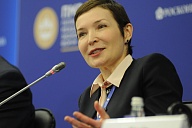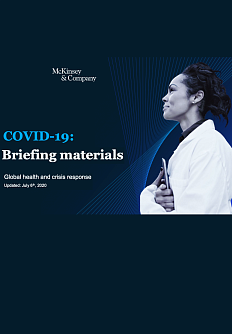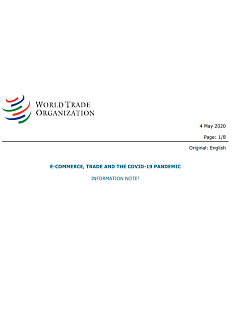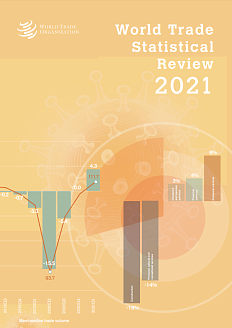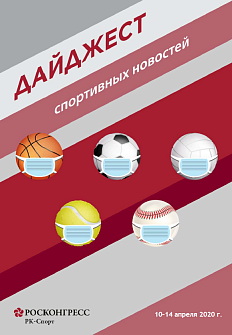Please note that all publications are provided for information purposes only and are not intended to be a substitute for professional medical advice, diagnosis, or treatment.
By the time the COVID-19 epidemic had begun, the Russian healthcare system was in a critical condition due to the unsuccessful reforms of the past few years, says Guzel Ulumbekova, Head of the Higher School of Healthcare Organization and Management, Doctor of Medical Science and MBA alumni of Harvard University. In this article, which has been prepared for the Roscongress Information and Analytical System, she shares her view on how the backlog of problems can be dealt with.
The COVID-19 pandemic has exposed the problems in the healthcare system in the Russian Federation and in many other developed countries, namely: the lack of hospital beds, medical staff and personal protective equipment; the breakdownin leadership between policy makers and regions; and the sluggishness of the systems which fund medical care.
But by the time the epidemic had begun, things became incommensurably worse for the Russian healthcare system. It found itself in a critical position due to the unsuccessful reforms of recent years (the much-vaunted streamlining), chronic underfunding and the powerlessness of medical workers.
Let’s look at some of the facts. As a result of ‘streamlining’ in the Russian Federation between 2012–2018, the number of medical practitioners in state and municipal medical organizations fell by 12% (46,000 people). The number of hospital beds fell by 15% (160,000) between 2012–2018, meaning that there were 15% less beds than in Germany. A particularly dire situation has emerged in rural areas, small and medium-sized cities and the primary healthcare tier, where there are 1.5 times fewer doctors than needed (36,000), 1.8 times fewer mid-level medical staff (66,000) and 1.9 times fewer paramedics (20,000).
In 2018, state expenditure on healthcare in the Russian Federation amounted to 3.3% of GDP. This is 1.5 times lower than in the A8 countries of the EU, which are comparable to Russia in terms of their level of economic development.
And in spite of all that, the overwhelming majority of medical workers, as well as all frontline healthcare workers, selflessly and heroically continue performing their duties while bearing an additional burden of fighting this epidemic. For 190 of them, it has already cost them their lives[1]. After all these trials and tribulations, national policy makers and society are in no position to continue pursuing the policy that has been followed for years.
Given the protracted nature of the pandemic and decrease in real income for the majority of Russia’s population, these new circumstances warrant the immediate development of a programme of managerial and financial reform in order to preserve the sustainability of the healthcare sector, correct the untenable situation for medical workers and in doing so provide social stability.
Proposals for healthcare reform in the Russian Federation for 2020–2022:
1) Improve the situation for healthcare workers
Establish a base salary across the board which is split according to key qualified groups: for doctors, no less than 4 times the minimum monthly wage; for mid-level medical workers, no less than twice the minimum monthly wage; and for junior medical personnel, no less than 1.5 times the minimum monthly wage (in 2019 this stood at RUB 12–13,000). This would mean that after 6 years of study at university a junior doctor would receive RUB 40–50,000 — the same as a graduate of a military academy (lieutenant) after 4 years of study. Moreover, establish legislative standards for the workload of medical workers: for core posts, the length of a working week in peacetime should not exceed 40 hours (or not more than 1.2 wage rates for part-time work). Give medical workers the same benefits as military personnel. This will attract more staff to the sector and help alleviate staff shortages.
Heads of regions and medical organizations should constantly monitor the psychological and emotional state of medical workers to avoid having them ‘burn out’. At the same time, they should take essential measures, including employing psychotherapists, developing tailored rehabilitation programmes and helping their staff with welfare issues.
2) Create a single chain of management
Centralize the management of healthcare by regional bodies under the auspices of the Ministry of Health to ensure rigorous implementation of universal requirements and place under the command of a public health monitoring and disease control body with a view to ensuring that activity is coordinated and the system is strengthened.
3) Increase state expenditure on healthcare and change the process of paying for medical care
Increase state expenditure on healthcare from RUB 3.8 trillion (3.5% of GDP in 2019) to RUB 6.5 trillion by 2022 (in 2019 prices) gradually, increasing it by RUB 1 trillion annually. By 2022, this will correspond to 6% of GDP (provided that GDP returns to the 2019 level by 2022). This is the absolute minimum.
Out of these additional funds, 50% should go toward raising the wages of medical staff, 25% toward providing the general public with free medicine as part of outpatient care (system of universal medical provision), and the remainder toward ensuring medical workers are better qualified and provided with training for crisis situations as well as supporting the work of medical organizations to lower the risk of infection.
Run all healthcare systems predominantly through public funding (i.e. combine funds of Compulsory Health Insurance resources with federal and regional budgets). Eliminate private medical insurance organizations, giving them a role in state organizations, and turn territorial organizations of the federal compulsory medical insurance fund into financial sub-branches of regional healthcare management bodies. Medical organizations must process payment according to the budget estimate with rewards for high quality and the volume of services. This is essential to provide continuous funding for medical care and ensure that patient streams are planned in the most efficient way.
4) Increase the accessibility and quality of medical care
Implement a system of universal medical provision for outpatients whereby prescribed medication is available to all citizens, as in other developed countries, and not merely to a limited circle of privileged people, as things currently stand in Russia. Establish that allegations of violations in medical care shall be considered by law enforcement agencies only after a professional analysis has been conducted either by a ministerial body or professional association of doctors, and the same for investigations into tax irregularities.
Establish that the construction of new state medical organizations for medical care provision should take place only after a cost-benefit assessment has been conducted in terms of its availability in private organizations.
5) Raise the quality of medical education and develop medical science
Provide a teaching staff salary at medical educational institutions and colleges to ensure that the base salaries are 2 times higher than practitioners and nurses respectively, as in Soviet times, thus creating conditions where they can increase their qualifications. This will significantly raise the quality of training for medical staff in universities and colleges.
Establish an internship scheme for all medical specialisms and increase the number of unpaid positions in residency training. Create the conditions for CME (continuing medical education), which involves setting aside dedicated time (no less than 1 working day every 2 months) and earmarking financial resources.
Bring in the act ‘On basic healthcare protection for citizens of the Russian Federation’ and provide medical science with 3 times more funding than the current level.
6) Maintain constant vigilance against epidemics and crisis situations
· Management: create a special centre dedicated to epidemic control within the Ministry of Health with extended powers and a separate budget. Develop a state plan of action for emergency situations, including management protocols within the healthcare system and protocols for coordination with other agencies. To cover additional expenses stemming from epidemics, create an anti-crisis fund within the Ministry of Health.
· PPE reserves: centralize management with a view to producing and seamlessly distributing PPE equipment, disinfected equipment and other required medicine and consumables between regions.
· Reserve capacity: calculate and ensure essential capacity within the healthcare system in emergency situations: availability of medical staff, hospital beds, medical equipment, tests, medicine, personal protective equipment, etc. Develop protocols to mobilize them. Create a reserve centre of medical staff within the Ministry of Health and earmark additional funds to prepare and retrain the medical staff which have been employed and are working in the system.
· Develop telemedicine and other remote technologies: significantly widen the use of telemedical technologies, develop the relevant infrastructure and reimburse it the same as personal (face-to-face) visits. This requires long-term federal investment. Develop a system of individual disease prevention for citizens with the aid of a digital platform.
· Provide sufficient staff for a tracking and tracing system. If we took the average number of staff that other countries have used to create a tracing service, we would need 45,000 people in the Russian Federation (i.e. 30 people per 100,000 of the population).
· Protocols for prioritizing the provision of medical care: develop protocols to triage and organize care for patients with chronic diseases who need priority medical care, as well as selection protocols when conducting outpatient telemedical consultations and in hospital waiting rooms.
[1]source: https://sites.google.com/view/covid-memory/home


